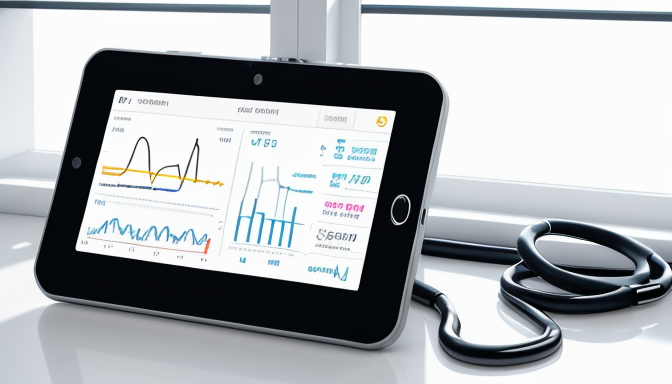In today’s fast-paced world, wearable devices have become an integral part of our daily lives, helping us monitor our health like never before. But why are these gadgets so popular? Well, imagine having a personal health assistant right on your wrist or in your pocket, ready to provide insights into your physical condition at any moment. These devices, ranging from smartwatches to fitness trackers, are designed to track various health metrics, making it easier for individuals to stay informed about their well-being.
As technology continues to evolve, wearable devices have become more sophisticated, offering features such as heart rate monitoring, sleep tracking, and even stress management tools. This real-time data empowers users to make informed decisions about their health. For instance, if your device alerts you to an irregular heartbeat, it could prompt you to seek medical advice sooner rather than later. In this way, wearables are not just gadgets; they are tools for proactive health management.
However, with great power comes great responsibility. While these devices provide valuable health insights, they also raise questions about privacy. Users often wonder: who has access to my health data? Are my personal details secure? As we embrace this technology, it’s crucial to understand the implications of sharing our health information.
Ultimately, wearable devices are revolutionizing how we approach our health. They offer a blend of convenience and insight, allowing us to take charge of our wellness journey. Whether you’re aiming to improve your fitness, monitor a chronic condition, or simply stay informed about your body, these devices are here to help. So, are you ready to embrace the future of health monitoring?
The Rise of Wearable Technology
Wearable technology has exploded in popularity over the past few years, transforming the way we interact with our health. Imagine strapping on a device that not only tells you the time but also tracks your heart rate, counts your steps, and even monitors your sleep patterns—all in real time! This remarkable advancement is largely driven by innovations in sensors and connectivity. With the ability to gather and analyze data instantly, these devices have become essential tools for anyone looking to take charge of their health.
From fitness enthusiasts to those managing chronic conditions, wearable tech offers something for everyone. Whether it’s a smartwatch or a fitness band, these gadgets empower users to monitor their health metrics conveniently. For instance, many devices can sync with smartphones, allowing users to access their health data via apps, making it easier than ever to stay informed about their well-being.
But what exactly is fueling this surge in wearable technology? Here are a few key factors:
- Increased Awareness: People are becoming more health-conscious and are seeking ways to improve their lifestyles.
- Advancements in Technology: New developments in sensor technology and battery life have made wearables more efficient and user-friendly.
- Social Influence: With friends and influencers sharing their fitness journeys, there’s a growing trend to join in on the fun.
As we embrace this new era of health management, it’s clear that wearable technology is not just a fad; it’s a revolution in how we approach our health. By seamlessly integrating into our daily lives, these devices are paving the way for a healthier future, giving us the tools we need to monitor and improve our well-being like never before.

Health Benefits of Wearables
Wearable devices have revolutionized the way we approach our health and fitness. Imagine having a personal trainer, nutritionist, and health monitor all wrapped around your wrist! These devices, equipped with cutting-edge technology, provide real-time insights into various health metrics, making it easier than ever to stay on track with your wellness goals. But what exactly are the health benefits that come with wearing these gadgets?
First and foremost, wearable devices excel in tracking physical activity. Whether you’re running, cycling, or simply walking, these devices can monitor your daily steps, calories burned, and even your heart rate. This constant feedback encourages users to stay active and can lead to significant improvements in fitness levels. For instance, a study showed that individuals who used fitness trackers increased their activity levels by an average of 30% compared to those who didn’t.
In addition to physical activity, wearables can also keep an eye on your sleep patterns. Quality sleep is crucial for overall health, and these devices can help you understand your sleep cycles, identify disturbances, and suggest improvements. By analyzing your sleep data, you can make informed decisions about your bedtime routine, leading to better rest and increased productivity during the day.
Moreover, many wearables monitor vital signs such as heart rate, blood pressure, and even oxygen saturation. This information is invaluable, especially for individuals with chronic conditions. By having access to real-time data, users can detect irregularities and take proactive measures before minor issues escalate into serious health concerns. In fact, some devices even alert users about potential health problems, acting as a first line of defense.
In summary, the health benefits of wearable devices are profound and multifaceted. They not only promote a more active lifestyle but also empower users with knowledge about their bodies. As technology continues to advance, we can expect these devices to become even more integral to our health management strategies.
Privacy Concerns and Data Security
As wearable devices become increasingly popular, the concerns surrounding privacy and data security are growing just as quickly. Imagine strapping on a gadget that not only tracks your steps but also monitors your heart rate, sleep quality, and even stress levels. While this can be incredibly beneficial for your health, it also raises a critical question: how safe is your personal information?
Wearable devices continuously collect sensitive health data, which can include everything from your daily activity levels to more intimate details like your heart rhythm. This data is often stored in the cloud, making it accessible but also vulnerable to potential breaches. Hackers and cybercriminals are always on the lookout for data that can be exploited, and health data is particularly valuable. Therefore, it’s crucial to understand the risks involved.
To mitigate these risks, manufacturers and users alike must be vigilant. Here are some essential steps to enhance your data security:
- Use Strong Passwords: Always create complex passwords for your devices and accounts.
- Enable Two-Factor Authentication: This adds an extra layer of security to your accounts.
- Regularly Update Software: Keeping your device’s software up to date can protect against vulnerabilities.
Moreover, it’s essential to read the privacy policies of the wearable devices you use. Many companies outline how they collect, use, and share your data, but not all policies are created equal. Some may sell your data to third parties, while others prioritize user privacy. Understanding these policies can empower you to make informed choices about which devices to trust.
In summary, while wearable devices offer a wealth of health benefits, they also bring significant privacy concerns. As technology continues to evolve, staying informed and proactive about your data security will be key to enjoying the advantages of these innovative tools without compromising your privacy.

Integration with Healthcare Systems
In today’s fast-paced world, the integration of wearable devices with healthcare systems is not just a trend; it’s a revolution. Imagine having your doctor’s office right on your wrist! These devices, like smartwatches and fitness trackers, are designed to seamlessly connect with healthcare platforms, providing real-time data that can significantly enhance patient care.
One of the most exciting aspects of this integration is the ability to monitor patients remotely. For instance, if you’re managing a chronic condition like diabetes, your wearable can continuously track your blood glucose levels and send that information directly to your healthcare provider. This means no more waiting weeks for your next appointment to discuss your health metrics. Instead, your doctor can make timely adjustments to your treatment plan based on the data received.
Furthermore, the use of wearables in healthcare facilitates personalized treatment plans. By analyzing the data collected from these devices, healthcare professionals can tailor interventions specifically suited to individual patient needs. For example, if a wearable indicates that a patient is not getting enough physical activity, the doctor can recommend a customized exercise regimen to boost their fitness levels.
However, this integration isn’t without its challenges. Concerns about data security and privacy loom large, as sensitive health information is transmitted over networks. It’s crucial for healthcare providers and tech companies to ensure that robust security measures are in place to protect patient data from unauthorized access.
As we look to the future, the potential for wearable devices to enhance healthcare systems is enormous. With advancements in technology, we can expect even more sophisticated integrations that will make healthcare more accessible and efficient. So, are you ready to embrace this new era of health monitoring?
The Future of Wearable Health Technology
As we gaze into the crystal ball of wearable health technology, it’s hard not to feel a surge of excitement. Imagine a world where your smart device not only tracks your steps but also predicts potential health issues before they arise. This is not just a dream; it’s the future that is rapidly approaching. With innovations in artificial intelligence and machine learning, wearables are becoming increasingly sophisticated, enabling a more proactive approach to health management.
One of the most thrilling developments is the integration of real-time health analytics. Wearables will soon be able to analyze data on the go, providing insights that can help users make informed decisions about their health instantly. For instance, if your heart rate spikes during a workout, your device could suggest a cooldown period or even notify a healthcare provider if it detects something abnormal. This level of personalized feedback could be a game-changer, allowing individuals to take control of their health like never before.
Moreover, the potential for interconnectivity between devices is set to revolutionize the healthcare landscape. Imagine a scenario where your smartwatch communicates with your home health monitor, sharing data seamlessly with your doctor in real time. This could lead to more personalized treatment plans and improved patient outcomes. The possibilities are as vast as the ocean, and the tide is turning in favor of smart health solutions.
However, with great power comes great responsibility. As we embrace these advancements, it’s crucial to address privacy and security concerns. Users must be educated on how to protect their data, ensuring that the benefits of wearable technology do not come at the cost of their privacy. The future holds immense promise, but it’s up to us to navigate this new landscape wisely.
Frequently Asked Questions
- What are wearable health devices?
Wearable health devices are gadgets like smartwatches and fitness trackers that monitor various health metrics such as heart rate, steps taken, and sleep patterns. They help users keep tabs on their health in real time, making it easier to stay fit and healthy.
- How do wearable devices benefit my health?
These devices can motivate you to be more active, help you track your sleep quality, and even alert you to potential health issues. By providing insights into your daily habits, they encourage healthier lifestyle choices.
- Are there privacy concerns with wearable devices?
Yes, there are valid concerns regarding data privacy. Wearable devices collect sensitive health information, which can be vulnerable to unauthorized access. It’s crucial to choose devices with robust security measures and to understand how your data is used.
- Can wearable devices integrate with healthcare systems?
Absolutely! Many wearable devices are designed to sync with healthcare systems, allowing for better patient monitoring and communication. This integration can lead to personalized treatment plans and improved health outcomes.
- What does the future hold for wearable health technology?
The future looks bright! With advancements in AI and machine learning, wearable technology is expected to become even more sophisticated, offering deeper insights and more tailored health management solutions.

